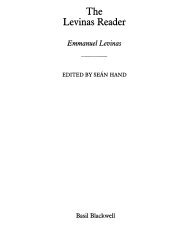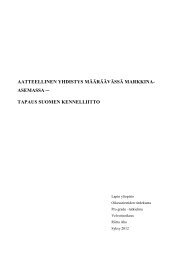You also want an ePaper? Increase the reach of your titles
YUMPU automatically turns print PDFs into web optimized ePapers that Google loves.
that the notion of understanding results from a traumatic process of violent tearing and<br />
laceration which forces meaning to appear. Both critique the problematic conception of<br />
instrumental language which compels definitive intelligibility and meaning. Kafka<br />
inherently allows for the possibilities of the traumatic in his writing. It is precisely this<br />
allowance for the “horrors” of infinite play and the radically undecidable that constitutes<br />
what Kafka saw as the necessary disruption – an opening or loosening of the rigidity of<br />
conceptual language. As Kafka puts it metaphorically in a diary entry: “Books must be<br />
the axe for the frozen sea inside us” (Diaries, 279).<br />
Given what I have stated, it would be inappropriate to use the following interpretive<br />
perspective: “Instead of…examining the meaning and function of the story’s enigmatic<br />
quality, critics have tended to want a kind of translation into a more normal code. This<br />
would imply that Kafka’s meaning is not radically different from anyone else’s but that it<br />
is expressed in a kind of private code; one goes to the diaries and letters to get the code,<br />
uses it to decode the works, and is then left with a meaning which is now independent of<br />
Kafka’s style of writing” (Ellis, 74).<br />
What I argue as my thesis is a reading of Kafka’s writing that would attempt a solution of<br />
the text’s problems from within, by an investigation of its structure. I would add that<br />
Kafka himself suggests such a reading in letters to Felice Bauer to whom he was engaged<br />
at the time. Speaking of the short story “Das Urteil” he says that it “is a bit wild and<br />
meaningless,” but that it has an “inner truth.” That is to say that my reading will present<br />
Kafka’s writing as radically immanent – whose truth is not some transcendental referent,<br />
but an aspect of the immanence that constitutes Kafka’s writing, that is, the infinite<br />
17





